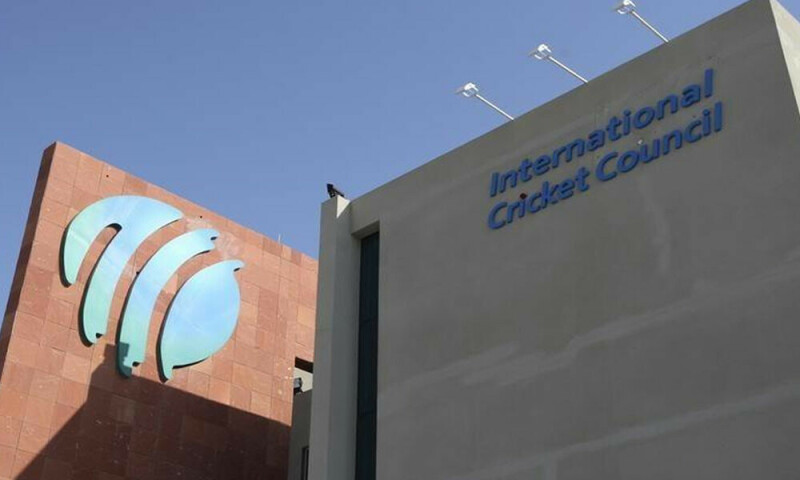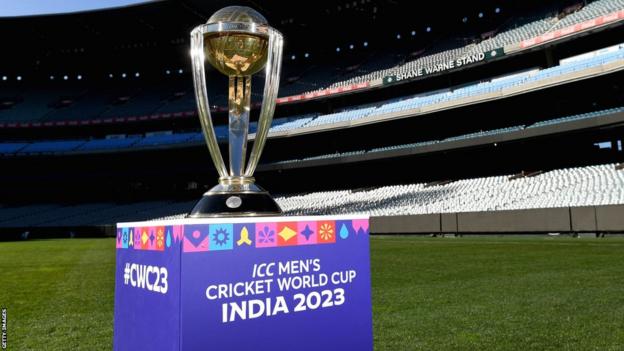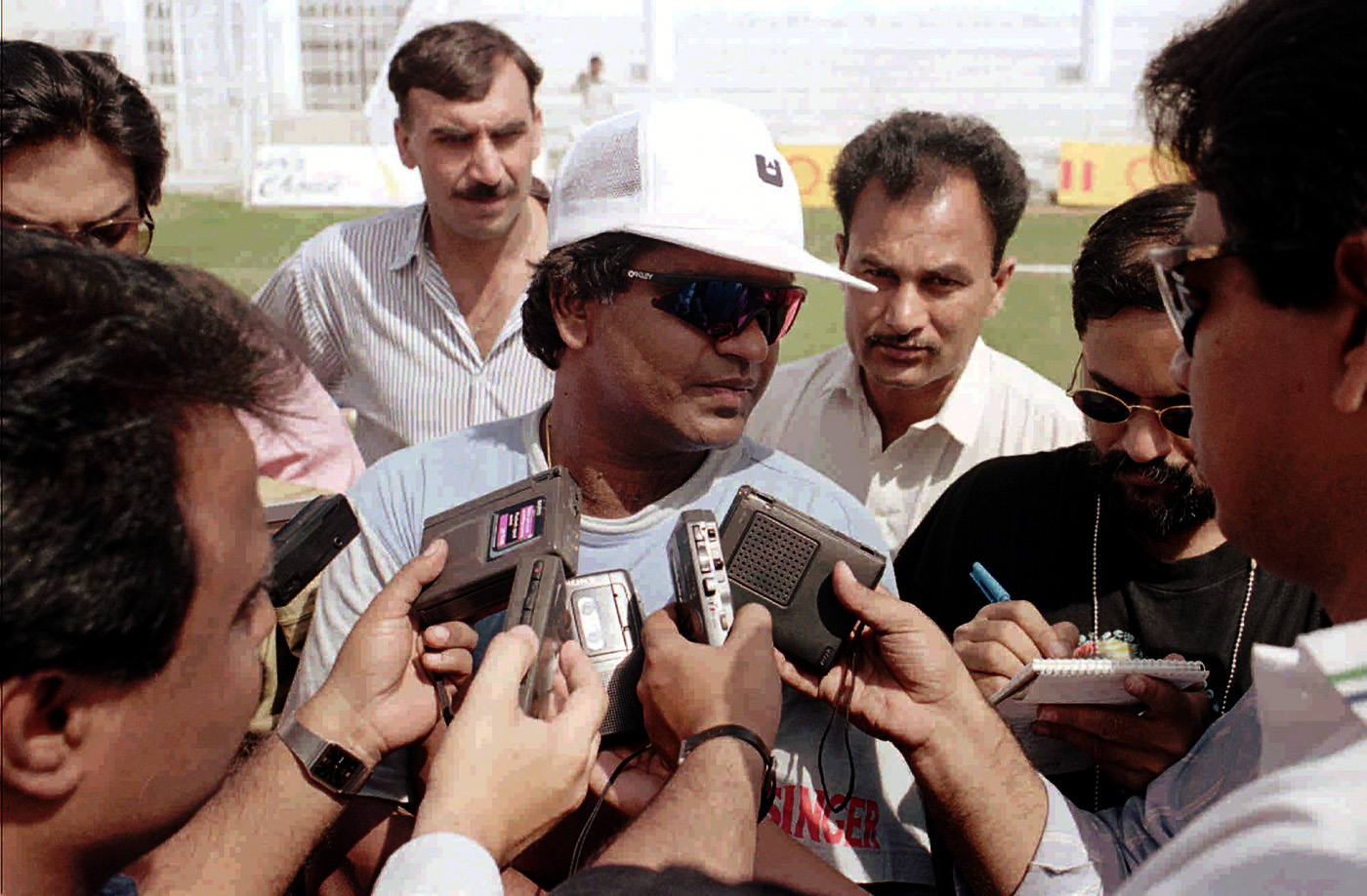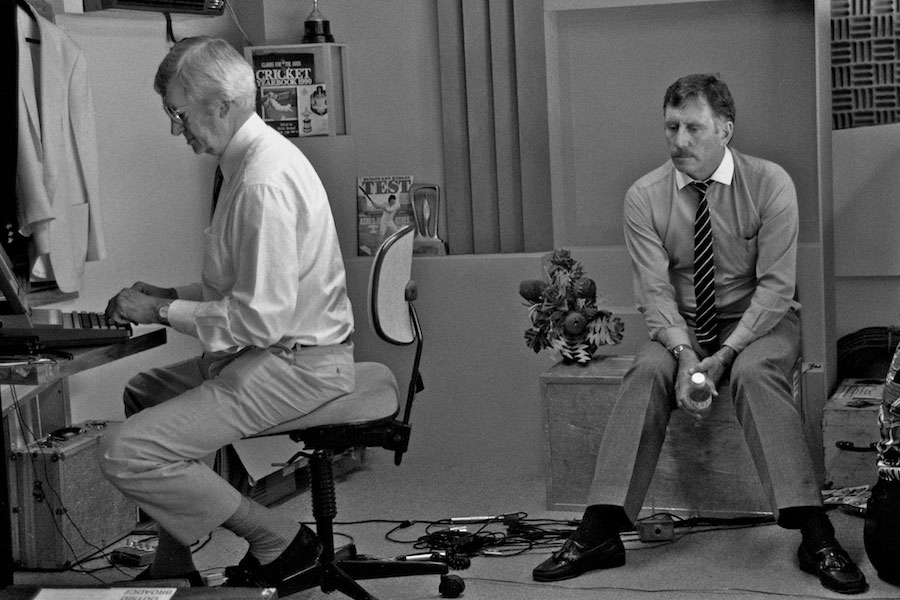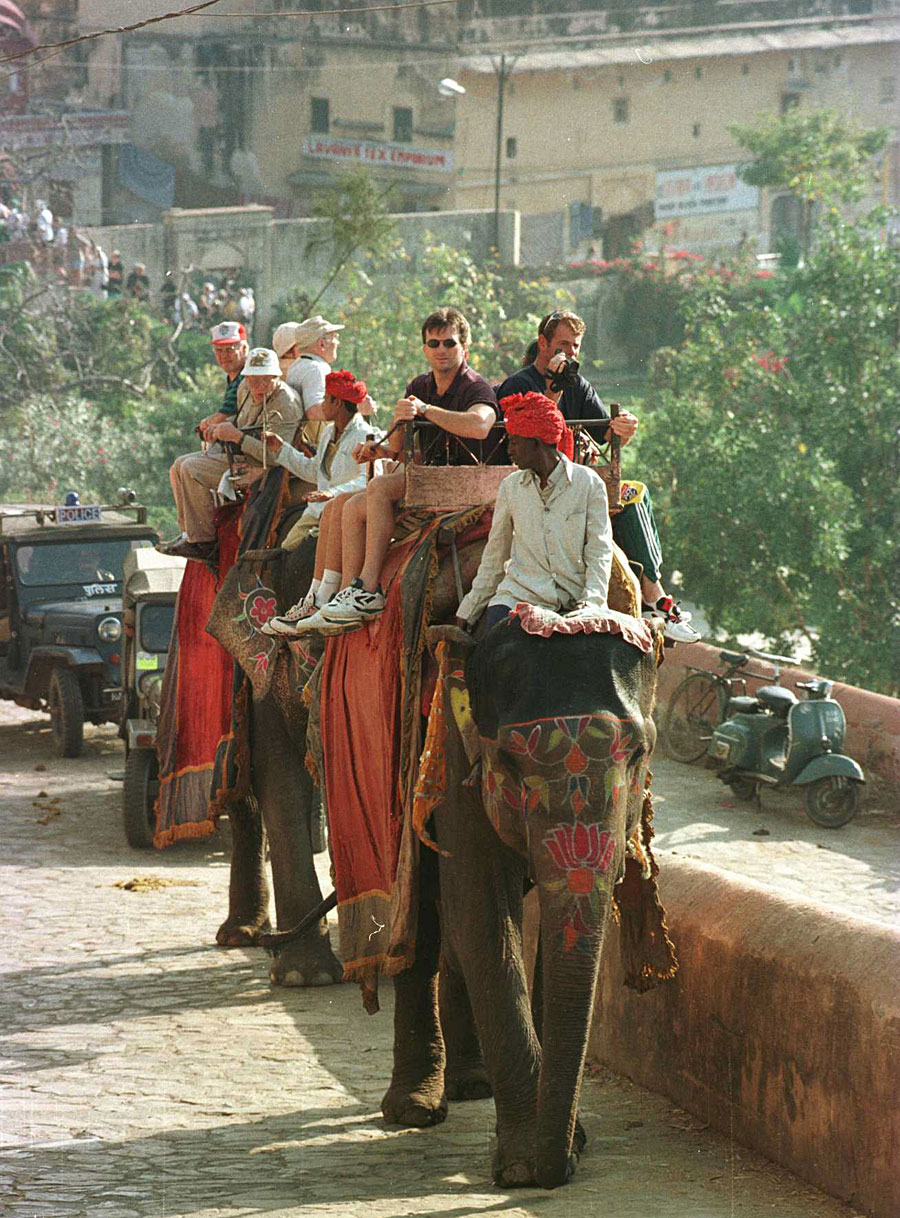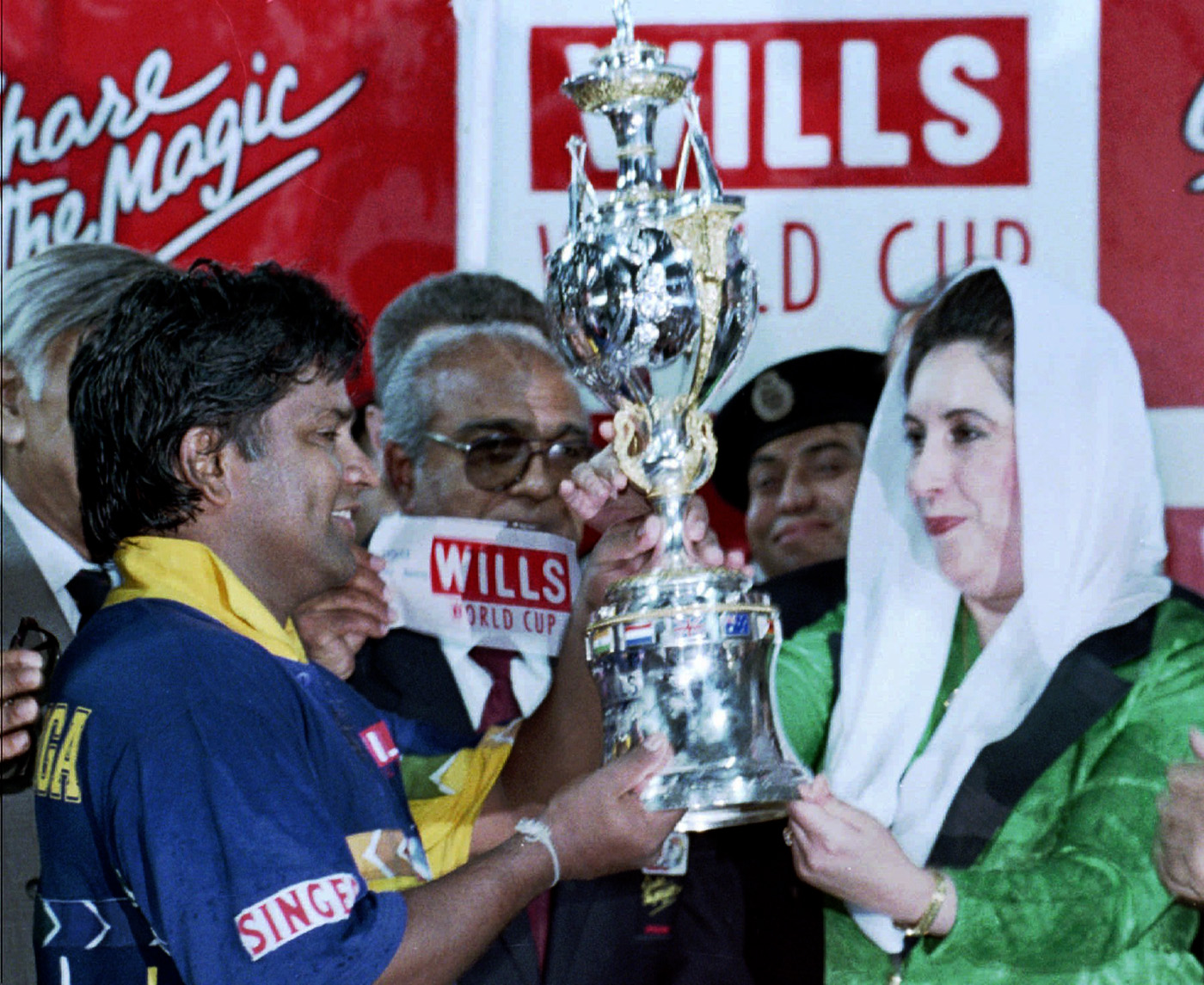,..,.
From Lahore to Madras at the 1996 World Cup, in cargo planes, delayed trains and on elephants
A look back at favourite World Cups: this time, the thrills and spills of the subcontinent
MARK NICHOLAS
SEPTEMBER 20, 2023
Ah, the 1996 World Cup. That was something. Chaos often reigned, characters thankfully shone, and underdogs did things that only a short time previously would have seemed impossible, even to them. Across five memorable weeks, the bewildering and the beguiling; the controversial and the constructive; the surprising and the satisfying chased us around three countries - India, Pakistan and Sri Lanka - whose honour it was to host the tournament and whose operational skills were tested to the limit by events and circumstance that frequently beggared belief. There were planes, trains, automobiles and elephants; red forts, pink cities and marble palaces; tuk-tuks, rickshaws and the roar of 1200cc engines in towns and villages that barely knew such powerful means of transport existed.
There was
Sachin Tendulkar and
Brian Lara,
Shane Warne and Glenn McGrath;
Wasim Akram, Waqar Younis, Curtly Ambrose and Courtney Walsh; Jacques Kallis, Allan Donald and Shaun Pollock. And there was
Arjuna Ranatunga,
Aravinda de Silva, and a tight group of Sri Lankans who outwitted the rest. Imran Khan, the winner in 1992, graced the final with his new wife Jemima, of Goldsmith stock.
Richie Benaud,
Tony Greig and
Ian Chappell brought the Channel Nine legend with them and graced the commentary boxes of lands entrenched in the game of cricket.
Mark Mascarenhas, the Harvard-educated Indian entrepreneur, whose WorldTel business managed Tendulkar's commercial affairs, had bid US$10 million for the television rights, and to some astonishment, was awarded them with barely a murmur. Almost immediately Sky New Zealand offered him three million for their piece of the action and Mascarenhas knew he was onto something. Sure, 1996 is 27 years ago, but $10 million? That's more heist than coup. Mascarenhas was a larger-than-life character, tragically killed in a car accident in 2002. For six weeks in the early part of 1996, he ruled the game's roost, ramped up the television coverage, and spread his great sense of optimism and commercial possibility on a game that, in the subcontinent at least, was still finding its feet. I loved him because he gave me a gig.
This World Cup was my second big break in broadcasting. The first had come six months earlier, when I began a three-year deal with Sky in the UK. Following England's tour of South Africa, the Sky crew moved on to Zimbabwe, where,
on a visit to the Streak family farm near Bulawayo - the home of Denis and his son Heath - I received a call from the executive producer of the tournament, Gary Franses. It was a bad line but a simple message. "Yes please!" I replied before he had finished inviting me to work with WorldTel on ten games in different parts of India and Sri Lanka. I was beyond excitement and hurried back to Harare for my flight to Mumbai.
Mascarenhas had laid on a private jet for Greig, Benaud and Chappell and it didn't turn up, so they took the train from Gwalior to Visakhapatnam. Greigy came on air 45 minutes after the start, as if nothing had happened
Friday, February 9, 1996
Mumbai's international airport was packed and chaotic at 2am - a vignette of India. The flight was painless but the wait at customs not so. Eventually, I was called to an officer who asked me to open my luggage before enquiring about the purpose of my visit. "World Cup," I proudly answered. He looked up in astonishment. "Vills Vorld Cup?" "Absolutely." Wills cigarettes were the sponsors. He was thrilled, zipped up my suitcase and asked for my autograph.
I had a few hours to kill before connecting to Kolkata for the opening ceremony and bumped into Mike Gatting and David Shepherd. A couple of beers later we were checking in for Indian Airlines 936, and we landed on the other side of the country at 8am. By 8.40, a plethora of taxi drivers had offered us a ride into town. That journey through the smog-filled sprawl was unique: essential India. The 1950 Ambassador Nova hustled past colonial reminders - the Tollygunge Club and the Victoria Memorial - before stuttering past the vast expanse of the maidan to our left, already sprinkled with cricket matches, and swinging right into the splendid Oberoi Hotel. How these commentators live!
Sunday, February 11
An emotive and unpleasant press conference, which I attended on behalf of London's
Daily Telegraph. The PILCOM (Pakistan-India-Sri Lanka Organising Committee) were on edge after Australia and West Indies refused to play in Sri Lanka because of a bomb explosion a week earlier in Colombo. No compromise could be reached and the points were forfeited.
As if that wasn't enough, the evening's opening ceremony was a shambles. The much hyped laser show fell flat and the presenter mistook many of the teams for one another - at one stage he asked the West Indian players to wave at the 110,000-strong crowd to prove they were Zimbabweans. Two million dollars it cost, which was hard to take, having seen homeless people live in the underbelly of the Howrah Bridge.
Wednesday, February 14
The press corps left the Oberoi at 4.30am on Monday morning and arrived in Ahmedabad after nine at night. Nice preparation for a World Cup match, said England's manager, Ray Illingworth. Same for both sides, said PILCOM. I was upgraded to business class, courtesy of the Wills World Cup badge on my blazer. This thing was currency and that blazer was front and centre of every trip I made from Kolkata to Colombo and Jaipur to Lahore. As it was, England, who dropped a few catches, had their
feathers ruffled by a feisty New Zealand, and on this first showing of the two teams, you'd have backed the Black Caps to go deeper in the tournament than Mike Atherton's outdated-looking team.
Sri Lanka captain Arjuna Ranatunga was never less than confident about his team's chances of winning the World Cup Zafar Ahmed / © Associated Press
Friday, February 16
To Hyderabad, the home of the biryani and, my notes of the time remind me, of Mohammad Azharuddin, who had upped sticks to Mumbai and moved in with the actor Sangeeta Bijlani. Azhar was captain of India and the one Muslim in the team. Thus, he created quite a stir.
Hyderabad was also the home of Sports Coaching Foundation, which housed the only bowling machine in India - a bit odd, given they had been on the market since the early 1980s. The academy had floodlights, Astroturf and sightscreens that switched between black and white. There were 12 coaches, psychologists and nutritional experts. Its purpose was to train six-to-16-year-old boys in the fundamentals of technique and approach - a eagerly awaited mirror of the academy in Australia, which had been much in the news. Looking back to that time is a reminder of the distance Indian cricket has come.
That night I met John Hampshire, coach of Zimbabwe, and Wes Hall, manager of West Indies, in the bar. Two great fellows who, in different ways, played a part in my life. I represented MCC in East Africa with Hampshire in 1983 and Hampshire's hard-nosed Yorkshire take on our performances made for a good listen. In 1999, I gave the eulogy at Malcolm Marshall's funeral in Barbados with Hall, the charismatic fast bowler, who was a man of the church by then and a superb orator. "Malcolm Denzil Marshall was the greatest fast bowler who ever lived," he began, "and the reason I can tell you this with absolute certainty is that the only thing Wesley Hall truly knows about is faaaast bowling!"
I digress. Wes said the pundits had written off West Indies. On the viewing that day
against Zimbabwe, I wasn't among them.
Saturday, February 17
I arrived in Colombo with Michael Henderson from the
Times. We were excited about our visit to this troubled but utterly beautiful land. No cars were allowed within half a mile of the airport terminals, which made our exit comfortable and airy but confusing too. I've no recollection of how we were met and taken to our hotels. I went straight to the Premadasa Stadium, where the Sri Lankan team were making a symbolic appearance in lieu of the Australia match being abandoned, but I missed both the players and whatever spectators came to cheer them. The empty concrete stands echoed loudly with the silence.
The Ilyushin hit the 50-metre runway with shattering force and the jets roared into a deafening reverse thrust. Equipment and humans were thrown everywhere. The tyres smelt of deep burn. We made it, just
Wednesday, February 21
Zimbabwe arrived late the previous day, played on Wednesday and were to leave on Thursday. Their cricketers would have seen nothing of this island by then: its plantations and paddy fields, beaches and temples, never mind the people, who sparkled, whatever the heartbreak of civil war.
In the match,
Sri Lanka hammered the Zimbabweans. After the immediate loss of the pinch-hit boys - Romesh Kaluwitharana and Sanath Jayasuriya - Asanka Gurusinha belied his reputation for a straight face and smashed half a dozen sixes, which was one less than the World Cup record held by Viv Richards.
Friday, February 23
Morning: I tune in to watch
Australia play Kenya and find Michael Slater, a member of the Aussie squad, doing the pitch report, and a cub sports reporter from Channel Nine in Sydney hosting the telecast. It transpires that Mascarenhas had laid on a private jet for Greig, Benaud and Chappell, but it didn't turn up, so they got the train from Gwalior to Visakhapatnam, which took all night and more. Greigy came on air 45 minutes after the start of the game as if nothing had happened.
Evening: This was the dinner that opened my eyes to another world. Ranatunga and the Sri Lanka coach, Dav Whatmore, took me to Beach Wadiya, a sand-between-your-toes seafood restaurant across the railway line on the way out of town, at which I was to eat four of my next six meals. Gorging on chilli crab and huge tiger prawns, I listened to their plans and marvelled at their confidence. Ranatunga was damn certain that Sri Lanka could win it. He explained each of his own players' roles, knew the strengths and weaknesses of every opponent, and predicted the pattern of various matches. He was sure a team from the subcontinent would win. I suggested Australia but he said, tongue in cheek, that neutral umpires put paid to their chances. He left early to rise at 4am the next morning and drive inland for a Buddhist blessing. The owner of the restaurant showed us his visitors' book with autographs and pictures of Princess Anne and Richard Branson logged alongside Phil Tufnell. He asked me back for lunch the next day, and dinner and lunch. So I went.
Tuesday, February 27
At last, a game to set the pulse racing. The revamped Wankhede Stadium sparkled under new floodlights and
India's and Australia's players put on a show. Australia won by 16. Mark Waugh eased his way to a hundred and then knocked over Tendulkar with an offbreak. Lucky he did because Sachin had 90 in quick time and was winning the game. The best batters I saw as a kid were Garry Sobers, Viv Richards, Graeme Pollock, Barry Richards and Greg Chappell. Two in this tournament matched them - Tendulkar and Lara. Mark Waugh comfortably matched them in the aesthetic if not quite in the substance.
Richie Benaud and Ian Chappell: two of the big names in the World Cup commentary booth in 1996 © Mark Ray
Thursday, February 29
Shock, horror.
Kenya beat West Indies. I could only imagine Wes Hall in that dressing room. I could easily imagine the Kenyan dressing room.
Meantime,
South Africa withstood Pakistan, and I withstood a flight to Nagpur sitting with Greig and Ian Chappell (yup, another upgrade) whose contrasting views on the game made for good copy.
Saturday, March 2
We left Nagpur soon after 10am on an Ilyushin 76, a huge airbus out of Ukraine that was transporting 9.5 tonnes of television gear from venue to venue. It had a cockpit for the pilot and two more for the gunmen. Inside was a dark and empty steel shell, exposed wires and cables, melting rubber tyres, vast static generators, ladders, cameras, and masses of computer kit. We could not help but think the previous cargo might have been Kalashnikovs and the last flight went to Afghanistan. Fifty of us sat quietly on metal: no seats, just metal benches and tired seatbelts. We swatted at mosquitos. Chappell slept atop a mountain of TV kit; Benaud clung on, white-knuckled. A video operator threw up.
Greig had gone ahead to Delhi to sing songs of praise for the
Sri Lankans, who cruised past India's big score with an electric batting display. This time the pinch-hit boys had their say, and Ranatunga's forecast was looking ever more likely.
After two hours, the Ilyushin hit the 50-metre runway with shattering force and the jets roared into a deafening reverse thrust. Equipment and humans were thrown everywhere. The tyres smelt of deep burn. We made it - just. There were weak smiles all round as we climbed onto terra firma, damp from sweat and to be damper still from the drizzle. Looking back, it was kinda fun but it sure wouldn't happen today.
Ranatunga was damn certain that Sri Lanka could win it. He explained each of his own player's roles, knew the strengths and weaknesses of every opponent, and predicted the pattern of various matches. He was sure a team from the subcontinent would win
Sunday, March 3
Beautiful Jaipur, the city built from pink sandstone, and what isn't is painted pink.
Richie Benaud was filming "pretties" and promos on an elephant that climbed the hill into the Pink City as he talked to the camera about its long and fabled history. Turned out he didn't much like the ride, so I jumped on for the journey down and he grabbed a tuk-tuk.
I had my first appointment with the commentary-box heavies the next day in Jaipur for the
Australia-West Indies game: Benaud, Chappell, Greig, Michael Holding and Sunny Gavaskar. I was too nervous to enter the room until Peter Roebuck wandered by, enquired as to my loitering, and told me to stop being a wuss.
It was a great thrill to be in there: boyhood heroes and all that. I did lead commentary and various of the others provided expert summary. Right way round, I guess. Everyone was dialled in to the West Indian response to defeat by Kenya. Apparently, Wes and Andy Roberts had read the team the riot act. The big question was who was running with the captain, Richie Richardson, and who wasn't? The message was that those who weren't could "eff off". Richie played a brave and skilful innings to see his team home and looked shot afterwards. One couldn't help but wonder how much he had left in the tank.
Tuesday, March 5
Arrggghh man! The night train to Kanpur is delayed five hours. I sleep on the platform. Flights to Kanpur were complicated but I now regret not exploring them further. Big mistake. I slip the guard 20 quid and whoosh, up I fly into first class. With a rat. The guard brings me Super-Killem pesticide. No luck. Nor with my right boot. No good. No sleep. I arrive in Kanpur 12 hours late and Ian Chappell introduces me on air as "… Mark Nicholas, who's been in the business five minutes and only works half-days."
Steve Waugh and Paul Reiffel ride an elephant at Amber Fort, Jaipur, during the World Cup © Getty Images
Thursday, March 7
The Lara factor. Brian is getting some stick for talking behind the players' backs about indiscipline, lack of talent, no spirit, and bad management. Lara is now a target and former players are weighing in. Richardson thinks it a "malicious and sad" piece of journalism and says he spent the previous night with Lara and they had not talked about it. In fact, Richie said Brian was utterly committed to winning the World Cup.
Richie had other things on his mind, having announced his retirement to take effect after the tournament. Meantime, Andy Roberts was sacked. I kid you not. Sacked during the tournament. Nice timing Richie - get 'em before they get you.
Saturday, March 9
It's quarter-final time. England are out - quite hopeless really.
Sri Lanka tear them apart.
In Bangalore, and thanks to a blistering assault by Ajay Jadeja on Waqar Younis,
India triumph over Pakistan against the odds. The teams had only played each other in neutral venues for the last seven years, and the occasion lives up to the billing. A vibrant and hugely patriotic crowd went ballistic in celebration. Akram will not have been popular at home. He pulled out of the game shortly before the toss.
Elsewhere at around time, after a gruelling week,
Lara played an innings against South Africa for the ages to silence the critics. The audacity and flourish in his batting made for compelling viewing, and the hundred came in just 83 balls. The South Africans, professional to the end, simply could not resist this force of nature and looked in shock by the end. Richie Richardson, in contrast, lives on.
I was in Madras for the
Australia-New Zealand quarter-final, which had some stupendous batting from Chris Harris that was first matched and then bettered by Mark Waugh. In a high-scoring game that appeared to be in the hands of the Kiwis, the Australians found a way, as is their wont.
The night train to Kanpur is delayed five hours. I arrive 12 hours late and Ian Chappell introduces me on air as "… Mark Nicholas, who's been in the business five minutes and only works half-days"
Tuesday, March 12
A 5.30am flight to Delhi, then a day-long wait for the train to Chandigarh. I hadn't managed to get to the Taj Mahal, which was infuriating. Instead, I wandered the bright bazaars of Old Delhi, which nestle beneath the Red Fort. I watched any number of pick-up cricket games that were enthusiastically played in
gallis, amid rickshaws, bikers, cyclists, hawkers and cows.
At the station, I climbed into a tight seat next to a woman and a boy, who suddenly threw up. Perhaps it's me. Anyway, I leapt off the train as it pulled out of the station and thought, right, what now? Where to find a bed and a beer? I headed to the British High Commission and asked for help. Incredibly, there was an old mate, who was on the High Commission council, who listened to my story and offered me his Land Cruiser and driver. Now that, folks, is falling down a drainpipe and coming up with a Mars bar in your mouth.
I covered the
Australia-West Indies semi-final for the
Daily Telegraph newspaper and for BBC Radio, and what a match! For the second day running, the team that seemed out for the count within 20 minutes of it starting pulled though. The day before, it was
Sri Lanka against India in Calcutta, though I saw nothing of it. On a dodgy pitch - re-laid after that embarrassing opening ceremony - Sri Lanka lost both openers in the first over but won easily. India were feeble, though not Tendulkar. The huge and volatile crowd threw bottles and more at the Sri Lankan players and eventually Clive Lloyd, the match referee, abandoned it in the Sri Lankans' favour. They were winning by a mile anyway.
In Chandigarh, Warne did a job on West Indies, who surrendered eight wickets for 37 and left their captain unbeaten on 49 and in despair. Here are the facts: Australia, batting first, were 15 for 4 but made 207 for 8 thanks to Stuart Law and Michael Bevan's ballsy fifth-wicket partnership. Then West Indies were 165 for 2 in the 42nd over before crumbling. It was fun to shout and scream with adjectives on radio commentary, but actually I felt sad, because a dynasty was over.
The trophy stayed in the subcontinent BK Bangash / © Associated Press
Saturday and Sunday, March 16 and 17
Lahore. Imran had a party for the great and the good on the Saturday night but the star guest, Mick Jagger, was stuck in Delhi with a private jet and no permission to land in Lahore. That tested Imran. I really liked Lahore, with its trees, parks and whitewashed sandstone. I even bought a carpet. Honest, I did. What a hassle getting that home.
The final
They did it. Of all the nutty, glorious, improbable things,
Sri Lanka surged past Australia and won the World Cup. There were scores to settle and settle them they did. It happened pretty much as Ranatunga predicted back at Beach Wadiya when he sat with me for two of those five meals. There were heroes at every turn but first among equals was Aravinda de Silva, who had the best World Cup final of anyone - including Viv - with wickets, catches and a wonderful, perfectly paced hundred that saw off the might of Warne, McGrath and the others who know no defeat.
After being called for throwing in Australia months earlier, Muthiah Muralidaran bowled the most telling spell of the match, which was the sweetest revenge, if not necessarily complete vindication. Ranatunga late-cut the winning runs with the touch of a surgeon. It was his favourite shot and, to bring death upon Australia, he used it many times, if not quite a thousand.
Australia were off colour, on the wrong end of the toss, and the script was probably written anyway. Ian Chappell managed to interview a tired-looking Mark Taylor but the crush on the podium was such that he bumped into Pakistan's prime minister, Benazir Bhutto, in the moments before she presented Ranatunga with the cup. No matter, all night that cup ran over.

